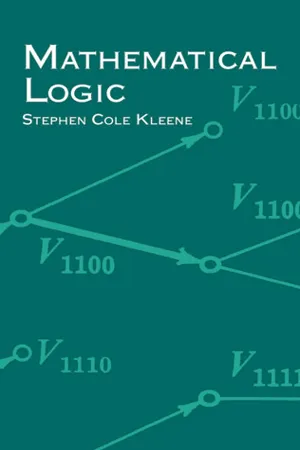
Mathematical Logic
Stephen Cole Kleene
- 416 pages
- English
- ePUB (adapté aux mobiles)
- Disponible sur iOS et Android
Mathematical Logic
Stephen Cole Kleene
À propos de ce livre
Undergraduate students with no prior classroom instruction in mathematical logic will benefit from this evenhanded multipart text. It begins with an elementary but thorough overview of mathematical logic of first order. The treatment extends beyond a single method of formulating logic to offer instruction in a variety of techniques: model theory (truth tables), Hilbert-type proof theory, and proof theory handled through derived rules.
The second part supplements the previously discussed material and introduces some of the newer ideas and the more profound results of twentieth-century logical research. Subsequent chapters explore the study of formal number theory, with surveys of the famous incompleteness and undecidability results of Godel, Church, Turing, and others. The emphasis in the final chapter reverts to logic, with examinations of Godel's completeness theorem, Gentzen's theorem, Skolem's paradox and nonstandard models of arithmetic, and other theorems. The author, Stephen Cole Kleene, was Cyrus C. MacDuffee Professor of Mathematics at the University of Wisconsin, Madison. Preface. Bibliography. Theorem and Lemma Numbers: Pages. List of Postulates. Symbols and Notations. Index.
Foire aux questions
Informations
Logic
ELEMENTARY MATHEMATICAL LOGIC